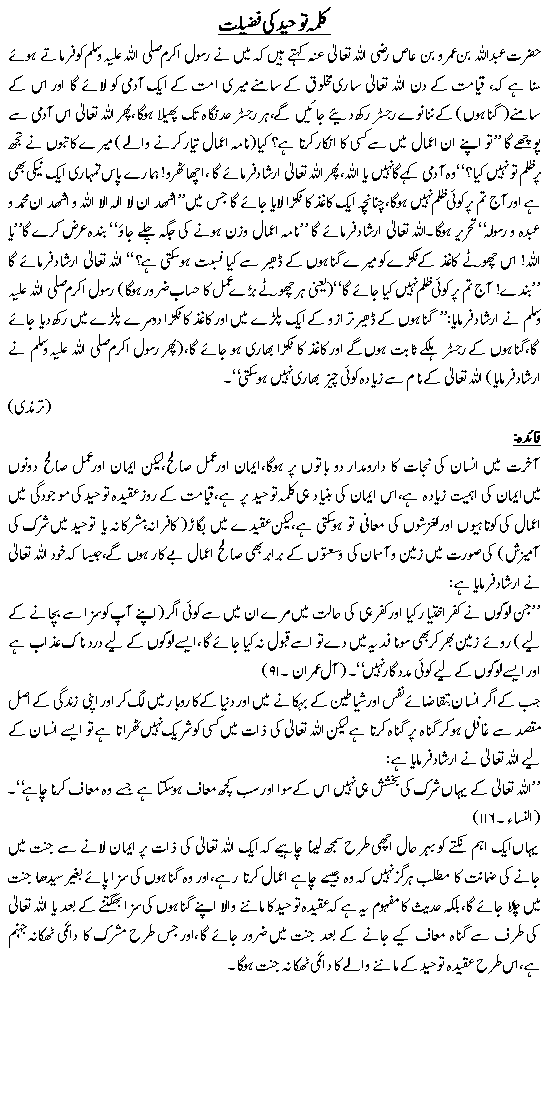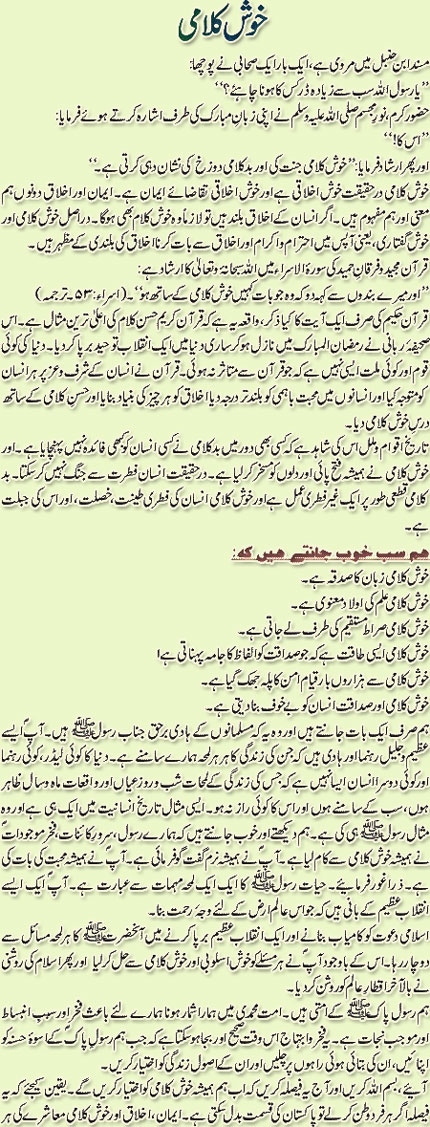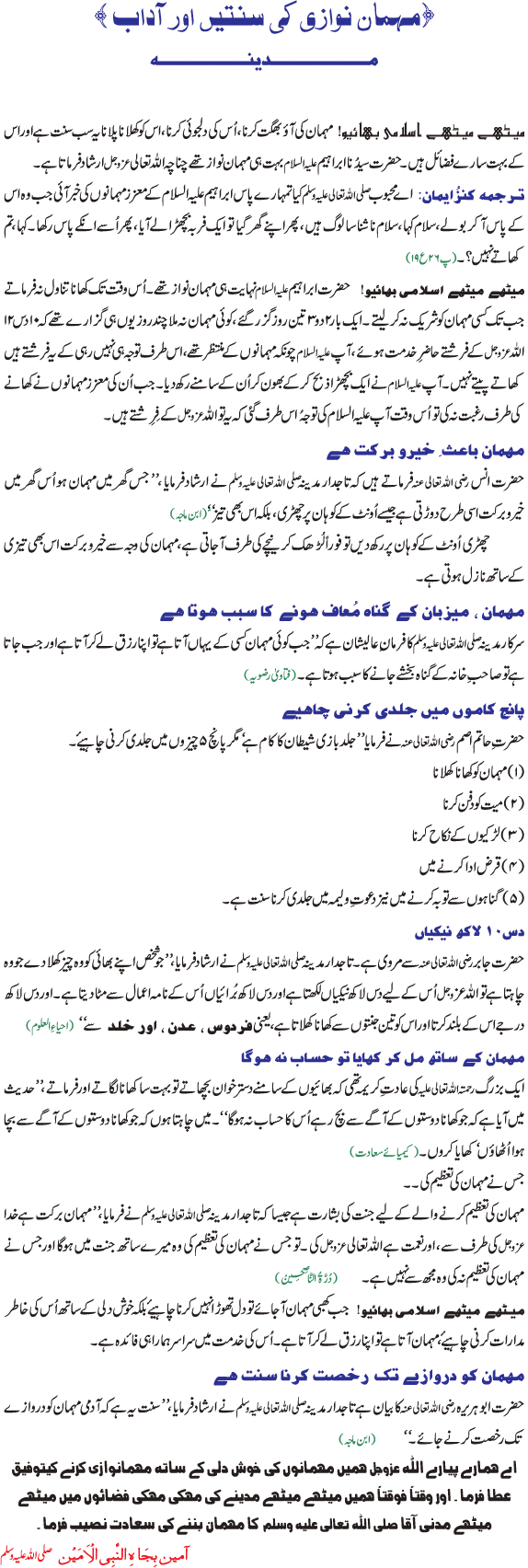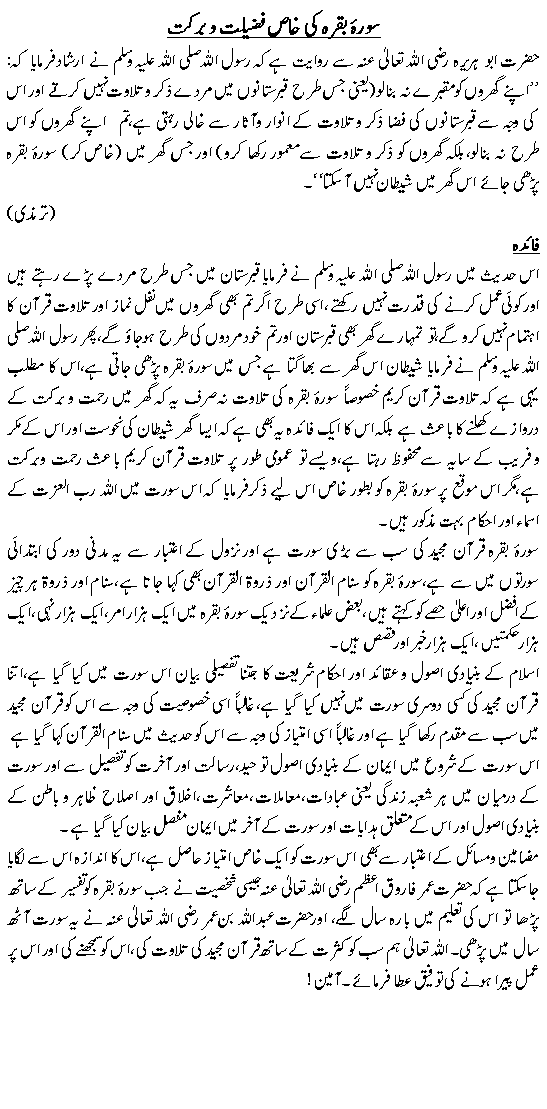
kalma Tauheed Ki Fazeelat
Archives
Love Of Allah
Ten causes that result in Allah’s love for His slave and the slave’s love for his Lord:
1. Reciting the Qur’an while pondering over its meanings and what is meant by it.
2. Getting closer to Allah by performing voluntary deeds after completing obligatory deeds. This is as is stated in a Hadith Qudsi: “My slave continues getting closer to Me by performing voluntary deeds until I love him.” (Al-Bukhari)
3. Continual remembrance of Allah under all circumstances, with one’s tongue, heart, and actions. The extent of one’s love of Allah is determined by this.
4. Giving precedence to what He loves over what you love when you are overtaken by your desires.
5. The heart being avid of Allah’s Names, and Attributes and the heart roaming in that garden of knowledge.
6. Observing Allah’s kindness, goodness, and bounties, both hidden and open.
7. This one is the most wonderful. The heart is soft, subdued, and meek before Allah.
8. Being alone with Allah during the time when the Lord descends during the last portion of the night while reading His Book and ending that by asking for forgiveness and repenting.
9. Sitting with the beloved and sincere, benefiting from the most fruitful of their speech. And not to speak unless speaking is more beneficial and you know that it will improve your state and be beneficial to others.
10. Remaining away from every cause that comes between the heart and Allah.
These ten causes take the lovers to the station of true love and bring them to their Beloved.
– Madarij As-Salikeen (vol. 3, pp. 17-18)
Khush Kalami


Khush Kalami
The Many Doors Of Sadaqah
Abu Dhar Al-Ghifari narrated that the Messenger of Allah (peace be upon him) said: “Sadaqah (charity) is prescribed for every person every day the sun rises.”
Abu Dhar asked: “O Messenger of Allah, from what do we give Sadaqah if we do not possess property?” The Prophet (peace be upon him) said: “The doors of Sadaqah are
- Takbir (Allahu Akbar);
- Subhan Allah; Alhamdulillah;
- La-ilaha-ilAllah; Astaghfirullah;
- Enjoining good; forbidding evil;
- Removing thorns, bones, and stones from the paths of people;
- Guiding the blind;
- Listening to the deaf and dumb until you understand them;
- Guiding a person to his object of need if you know where it is;
- Hurrying with the strength of your legs to one in sorrow who is appealing for help; and
- Supporting the weak with the strength of your arms.
These are all the doors of Sadaqah.” (Ahmad)
Mehman Nawazi Ki Sunnatain

Mehman Nawazi Ki Sunnatain
Search for Inner Peace
In the Glorious Qur’an, Allah, Most High, says: He it is Who sent down As-Sakinah (calmness and tranquility) into the hearts of the believers, that they may grow more in Faith along with their (present) Faith. And to Allah belong the hosts of the heavens and the earth, and Allah is Ever All-Knower, All-Wise. (48:4)
We are at a time of great stress and tension. Muslims and non-Muslims both have fears and anxieties. The world situation has not been good for several decades, but since the tragedy of Sept. 11, 2001, there is more distress all over the world. The situation looks very grim and terrible for the whole humanity. Social, economic, political and environmental conditions of the whole world are deteriorating. Injustice, crimes, violence, evil and sins abound everywhere in the world.
Many Muslims now feel pessimistic and disheartened. We have painful conditions in Palestine, Kashmir, Chechnya, and other places, where we see our Muslim brothers and sisters going through a lot of suffering. Wars are waged against Muslims in different parts of the world. Thousands of innocent men, women, and children are dying. The anti-Islam propaganda and Islamophobia are on the rise here and in many other places.
We need inner peace and the whole of humanity needs it. Inner peace is always important but it is most needed now. It is the peace of heart and mind. Inner peace makes people steadfast, strong, and capable to face problems. If there is no inner peace people lose the courage and strength to face difficulties. People become sick and develop many other physical, emotional, or psychological problems.
Islam and Inner Peace
Islam is the religion of peace. Prophet Muhammad (peace be upon him) used to say and write in his letters to the chiefs of tribes in his time: “Aslim Taslam (Accept Islam and find peace.)”
Islam places great emphasis on inner peace. In the Qur’an, it is called Sakinah (inner calm and tranquility), Tuma’ninah (the comfort of the heart, satisfaction, and contentment) Sharh As-Sadr (understanding, openness of the chest, restfulness). Believers receive these gifts from Allah Almighty. In the most difficult situations, Allah mentions that He bestowed inner peace on the believers.
Surah Baqarah Ki Khas Fazeelat

Surah Baqarah Ki Khas Fazeelat
Earthquakes: Allah’s Wrath Or Geological Occurrence?
WHY do earthquakes occur? A student of geology will say they are a result of a sudden release of energy in the Earth’s crust that creates seismic waves. That’s the process of how earthquakes occur, but not an answer to why earthquakes occur.
A better-phrased question will be: Who causes earthquakes to occur and why? Allah says in the Qur’an:
“Say: ‘He has the power to send torment on you from above or from under your feet, or to cover you with confusion in party strife, and make you taste the violence of one another.’” (Qur’an, 6:65)
Allah sends earthquakes as a punishment for some because of their sins and as a reminder or warning for others to repent and mend their ways. Allah says in the Qur’an:
“And We sent not the signs except to warn…” (Qur’an, 17:59)
Just as Allah sends down blessings for His creation in the form of rain, good cultivation, and abundance of sustenance, He also sends down warnings and punishments in the form of earthquakes and tsunamis. Allah says:
“And whatever of misfortune befalls you, it is because of what your hands have earned. And He pardons much.” (Qur’an, 42:30)
The above verse is of particular importance. It shows that whatever calamity strikes us is a result of our wrong deeds. Moreover, Allah pardons a lot. Meaning, the punishment doesn’t come except when people have crossed all limits. The place where a calamity strikes may have both good and bad people. When sins rise in a community and punishment is sent down, it also affects the good people. While that calamity is a punishment for the sinners, it becomes a source of purification or a reminder for the good doers. The Prophet (peace be upon him) used to seek refuge with Allah from His torment and punishment.
An increase in the frequency of earthquakes is also a sign of the Day of Judgment. The Prophet (peace be upon him) said, “The Hour (Last Day) will not be established until (religious) knowledge will be taken away (by the death of religious learned men), earthquakes will be very frequent, time will pass quickly, afflictions will appear, murders will increase and money will overflow amongst you.” (Al-Bukhari, 2/17 no. 146)
The prophecy of Prophet Muhammad (peace be upon him) seems ever approaching. Time is passing by quickly, though the day still has 24 hours. The religiously learned are fewer than in the past and the crime rate has increased multifold.
Sonay Jagne Ki Sunnatain

Sonay Jagne Ki Sunnatain
Jihad Against The Self
Fighting the evil within us is more difficult than fighting on a battlefield. Ibn Qayyim mentions in Za’d Al-Ma’ad the four states of Jihad against the self:
First: To strive in learning guidance and the religion of truth, without which there will be no success. Indeed, there can be no true happiness, nor any delight in this world and in the Hereafter, except through it.
Second: Strive to act upon what has been learned, since knowledge without action will not benefit, rather it will cause harm.
Third: Strive to invite others towards it and to teach those who do not know, otherwise you may be considered among those who hide what Allah has revealed of guidance and clear explanation. Such knowledge will neither benefit, nor save a person from the punishment of Allah.
Fourth: Strive to be patient and persevering against those who oppose this da’wah (call) to Allah and those who seek to cause harm – patiently bearing all these hardships for the sake of Allah.
When a person succeeds in all these four stages, he is considered to be amongst the Rabbaniyyun (Allah’s men). Early scholars have agreed that a scholar does not deserve the title of Rabbani until he recognizes and knows the truth, acts upon it and teaches it to others. So whosoever has the knowledge, acts upon it, and teaches this knowledge to others, is considered among the “Rabbaniyyun.”

